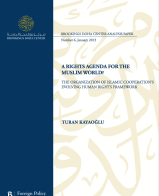
The Organization of Islamic Cooperation’s Evolving Human Rights Framework
TURAN KAYAOĞLU, Brookings Doha Center Analysis Paper Number 6, January 2013
This study provides an assessment of the OIC’s human rights instruments. It argues that their impact has remained limited for two reasons. The first is religious: the OIC lacks a clear framework dealing with the issue of compatibility between international human rights norms and the conservative brand of Islam dominant among leading OIC member states such as Saudi Arabia, Iran, and Pakistan. The second reason is structural: the organization’s state-centric nature complicates the functioning of its human rights mechanisms. Within the OIC, the primacy accorded to states diminishes the organization’s authority as a supra- national body and inhibits its ability to work with NGOs on the promotion of rights.
Despite its shortcomings, the OIC has real potential as an advocate of human rights in the Muslim world. Unfortunately, this potential has been overlooked by the international human rights community, which has little knowledge of the OIC and its human rights agenda. International debates about the OIC and human rights have been selective, focusing on issues such as the defamation of religion, gender, and gay rights.
In discussing the OIC as a human rights actor and the factors preventing it from fulfilling such a role, this paper attempts to shift the debate on Islam and human rights from a cultural and religious framework to an institutional one. As such, its focus is not on the compatibility of sharia with universal human rights, but on the structural obstacles that prevent the OIC and its member states from establishing effective human rights mechanisms.
The paper offers three principal arguments. First, that Muslim states’ commitment to a traditional understanding of sovereignty has been an obstacle to the advancement of human rights in the Muslim world. Second, it argues that the evolution of the OIC’s human rights instruments shows a shift over time, from an emphasis on sharia to an emphasis on sovereignty. The study concludes by positing that if the OIC were to have greater authority over individual states on human rights issues, it could be a more effective force for promoting human rights in the Muslim world. An approach that focuses not on the difficulty of aligning human rights and Islamic law, but on the necessity of “sharing sovereignty,” could empower OIC institutions and strengthen human rights NGOs.


